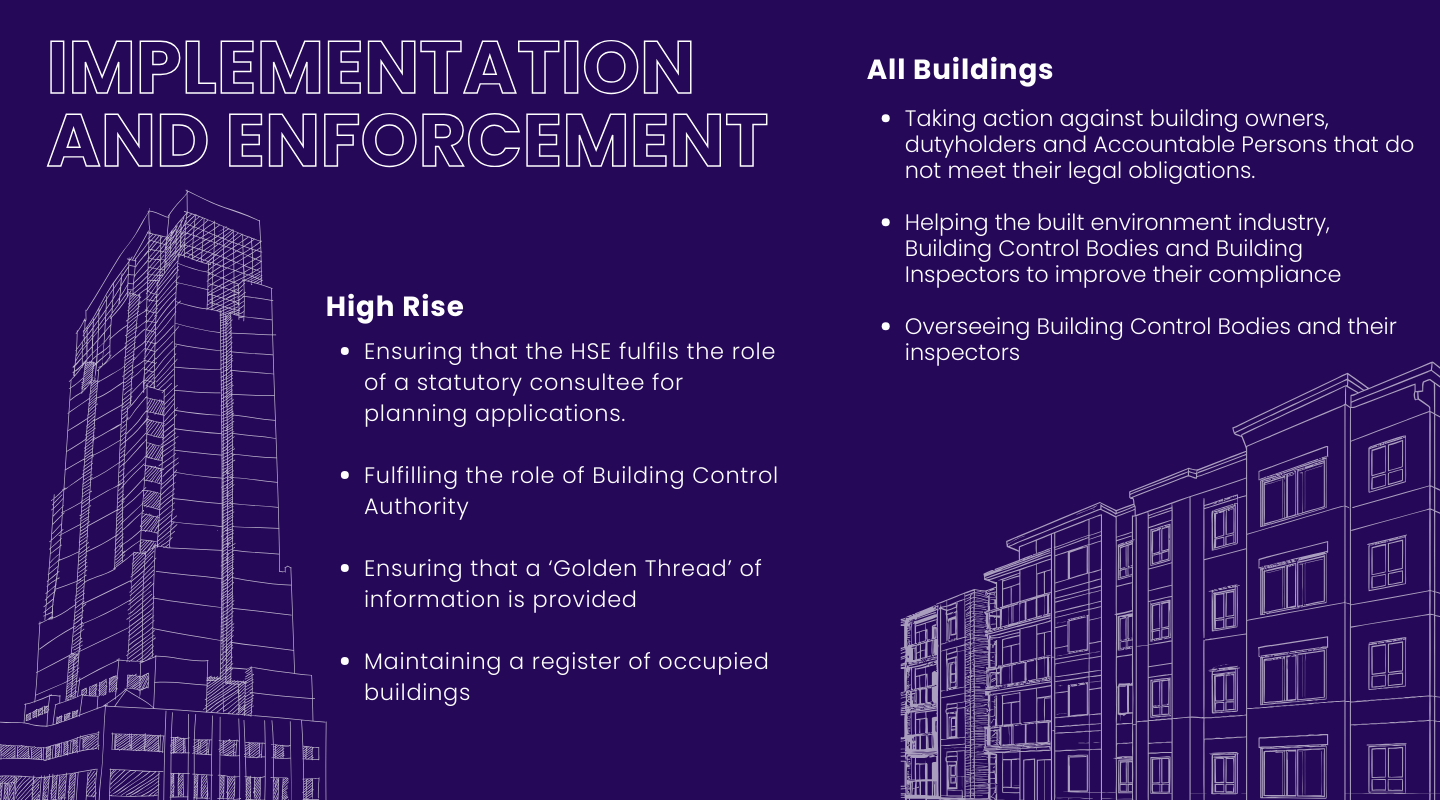
Regulatory Bodies And The Building Safety Act
The Building Safety Act establishes a robust framework for enforcement and regulation, creating three key regulatory bodies: the Building Safety Regulator, the Construction Products Regulator, and the New Homes Ombudsman.
These entities are tasked with implementing and overseeing a more stringent set of safety standards, particularly for high-risk buildings, while also improving competence, compliance and culture across the industry.
For professionals in the building sector, including building engineering services companies, the Act brings about substantial changes in responsibilities, compliance requirements, and potential liabilities, reshaping the landscape of building safety in the UK.

What is the role of The Building Safety Regulator (BSR)?
The Building Safety Regulator (BSR) in England is part of the Health and Safety Executive (HSE) and was established under The Building Safety Act 2022 to regulate higher-risk buildings, raise safety standards of ALL buildings and help professionals in design, construction, and building control, to improve their competence.
They want residents to be safe where they live. They want to restore confidence in the safety and standards of all buildings and drive positive cultural change in the built environment.
For All Buildings:
- Oversee general safety and performance standards
- Promote competence among industry professionals and regulators
- Provide advice to government on building safety and standards
- Review and update building regulations
For High-Risk Buildings:
-
Implement a more stringent regulatory framework
-
Establish and maintain a register of high-risk buildings
-
Enforce the new safety case regime
-
Oversee The Golden Thread of information throughout a building's lifecycle
What does this mean for building engineering services companies in the Construction Industry?
All Buildings:
- New duty holder roles and responsibilities including competence requirements
- Increased scrutiny of work quality and safety standards
- Increased requirement for evidencing competence and compliance of project work
- Demonstrating organisational capability
- Changes to compliance processes
High-Risk Buildings:
- New duty holder roles and responsibilities including competence requirements
- Planning, Construction and Occupation Gateways
- Change control processes
- Mandatory reporting of safety-related defects
- Participation in maintaining The Golden Thread of information
What role do the Building Safety Regulator have in the enforcement of the Building Safety Act?
The BSR can issue compliance notices, stop notices, and impose fines for all buildings. For high-risk buildings, additional measures include more frequent inspections and stricter penalties for non-compliance.
What is the role of The Construction Products Regulator?
The Construction Products Regulator, is a key component in enhancing UK construction safety. Operating within the Office for Product Safety and Standards, this body ensures construction products meet safety standards and perform as claimed. It investigates complaints, conducts market surveillance, and can remove unsafe products and prosecute non-compliant manufacturers.
What role do the Construction Products Regulator have in the enforcement of the Building Safety Act?
This regulator will confront poor practice and provide vital market surveillance so that safety concerns can be spotted and dealt with earlier, including requiring the removal of unsafe construction products from the market and taking action against those who do not comply with the regulations.For the construction industry, including building engineering services companies, this means increased product scrutiny, stricter compliance requirements, and greater emphasis on transparent product information, recording and reporting.
What is the role of The New Homes Ombudsman?
The New Homes Ombudsman aims to enhance the quality and safety of new-build homes in the UK. This independent body provides a free dispute resolution service for homebuyers, addressing complaints about build quality, warranties, and after-sales service.
Developers are required to join the scheme, ensuring accountability across the sector. For building engineering services companies involved in new residential projects, this means an increased focus on installation quality and customer satisfaction. The Ombudsman's ability to recommend compensation or remedial action underscores the importance of maintaining high standards in all aspects of new home construction, including building services.
Building engineering services companies must stay informed about these changes, particularly the distinctions between high-risk and all buildings, to ensure compliance and maintain their competitive edge in the evolving building services landscape.
Latest Building Safety Act News from BESA
3 min read
BESA creates ‘route to compliance’ for vent ...
2 min read
BESA Awards 2026 open for entries
4 min read
